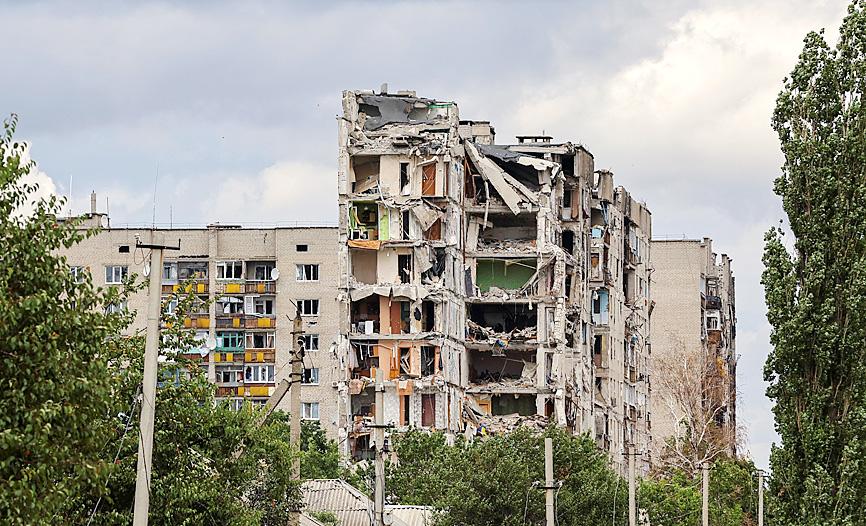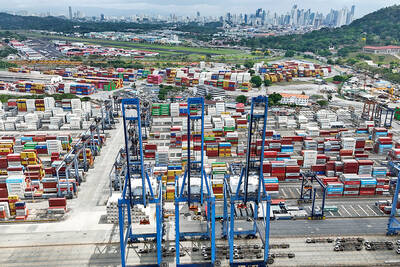North Korea could send workers to two Russian-controlled territories in eastern Ukraine, Russian Ambassador to North Korea Alexander Matsegora said — a move that would pose a challenge to international sanctions against the North’s nuclear weapons program.
NK News, a Seoul-based Web site, reported that Matsegora said North Korean workers could help rebuild the war-shattered infrastructure in the self-proclaimed people’s republics in Donetsk and Luhansk.
Matsegora said there were potentially “a lot of opportunities” for economic cooperation between the North and the self-proclaimed republics in Ukraine’s Donbas region, despite UN sanctions.

Photo: Reuters
NK News said he told the Russian newspaper Izvestia in an interview that “highly qualified and hard-working Korean builders, who are capable of working in the most difficult conditions, could help us restore our social, infrastructure and industrial facilities.”
His comments come days after North Korea became one of only a few countries to recognize the two territories, accusing the Ukrainian government of being part of Washington’s “hostile” stance toward Pyongyang.
“Ukraine has no the right to raise issue or dispute our legitimate exercise of sovereignty after committing an act that severely lacks fairness and justice between nations by actively joining the US unjust and illegal hostile policy in the past,” the North Korean Ministry of Foreign Affairs said.
In response, a furious Ukraine cut diplomatic ties with North Korea and accused it of undermining Ukraine’s sovereignty and territorial integrity.
Ukrainian Minister of Foreign Affairs Dmytro Kuleba said Russia’s appeal to North Korea for support showed that Moscow had “no more allies in the world, except for countries that depend on it financially and politically.”
Ukraine had already suspended its political and economic contact with North Korea as part of UN-led sanctions aimed at pressuring Pyongyang to dismantle its nuclear and ballistic missile programs.
North Korea has traditionally earned much-needed foreign currency by sending its citizens to work overseas. Under UN-sanctions they were supposed to have been repatriated by the end of 2019, but significant numbers of North Korean laborers have reportedly continued to work in Russia and China, as well as in Laos and Vietnam.
Matsegora left open the possibility for another showdown with the UN over sanctions after he said that North Korean factories and power stations built during the Soviet era could use equipment built in the Donbas region, where Moscow-backed forces have been fighting Ukraine since 2014.
This would contravene a UN ban, imposed in late 2017, on North Korea acquiring industrial machinery, electronic equipment and other items.
Matsegora said that sanctions could frustrate attempts to establish a trade link between the republics and North Korea, but said economic ties were “absolutely justified,” NK News said.
Go Myong-hyun, a research fellow at the Asan Institute for Policy Studies in Seoul, was quoted by NK News as saying that economic cooperation would confirm that Russia — a permanent member of the UN security council that has imposed sanctions on the North — had become a rogue state.
“Once Russia violates the very sanctions it had authorized, the security council would be critically undermined,” Go said.

THE TRAGEDY OF PUNCH: Footage of the seven-month-old Japanese macaque has gone viral online after he was rejected by his mother and formed a bond with a soft toy A baby monkey in Japan has captured hearts around the world after videos of him being bullied by other monkeys and rejected by his mother went viral last week. Punch, a Japanese macaque, was born in July last year at Ichikawa City Zoo. He has drawn international attention after zookeepers gave him a stuffed orangutan toy after he was abandoned by his mother. Without maternal guidance to help him integrate, Punch has turned to the toy for comfort. He has been filmed multiple times being dragged and chased by older Japanese macaques inside the enclosure. Early clips showed him wandering alone with

South Korea would soon no longer be one of the few countries where Google Maps does not work properly, after its security-conscious government reversed a two-decade stance to approve the export of high-precision map data to overseas servers. The approval was made “on the condition that strict security requirements are met,” the South Korean Ministry of Land, Infrastructure and Transport said. Those conditions include blurring military and other sensitive security-related facilities, as well as restricting longitude and latitude coordinates for South Korean territory on products such as Google Maps and Google Earth, it said. The decision is expected to hurt Naver and Kakao

Australian Prime Minister Anthony Albanese yesterday said he did not take his security for granted, after he was evacuated from his residence for several hours following a bomb threat sent to a Chinese dance group. Albanese was evacuated from his Canberra residence late on Tuesday following the threat, and returned a few hours later after nothing suspicious was found. The bomb scare was among several e-mails threatening Albanese sent to a representative of Shen Yun, a classical Chinese dance troupe banned in China that is due to perform in Australia this month, a spokesperson for the group said in a statement. The e-mail

‘OCCUPATION’: Hong Kong said it had lodged ‘stern protests’ with Panama’s consulate, and would ‘staunchly support’ the rights and interests of Hong Kong companies Panamanian President Jose Raul Mulino on Monday ordered the temporary occupation of two ports run by a unit of CK Hutchison Holdings Ltd following the Supreme Court’s ruling against the firm’s concession, escalating a dispute that has become a proxy battle between the US and China in Latin America. Mulino said in a speech that the administration and operation of the two ports on the strategic Panama Canal is to revert to the country’s National Maritime Authority to ensure their uninterrupted, safe and efficient operation. The occupation covers movable equipment at the ports and does not mean a definitive loss of